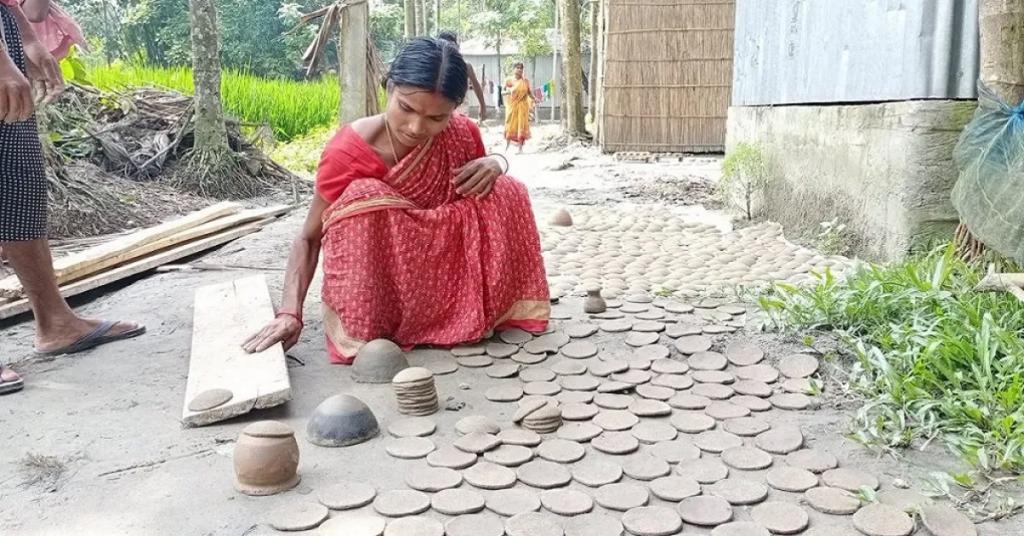
Are Earthen Lamps a thing of the past? Bengal potters express despair, the once cherished profession is slowly fading away.
07, Nov 2022 | Mohammed Ripon Sheikh
It has not been a busy environment at potter-couple Mahesh and Nandita’s Birbhum residence-workshop, for a while now. Although once, it used to be a thriving affair with most of their days being consumed by making earthen pots and diyas. Especially during big occasions like Navratri and Diwali. Often, they have had to turn people away because they just didn’t have enough earthen lamps to meet the demand. But those events have become estranged memories now.
CJP’s Grassroots Fellowship Program is a unique initiative aiming to give voice and agency to the young, from among the communities with whom we work closely. These presently include migrant workers, Dalits, Adivasis and forest workers. CJP Fellows report on issues closest to their hearts and home, and are making impactful change every day. We hope to expand this to include far reaching ethnicities, diverse genders, Muslim artisans, sanitation workers and manual scavengers. Our raison d’etre is to dot India’s vast landscape with the committed human rights workers who carry in their hearts Constitutional values, to transform India into what our nation’s founders dreamt it to be. Please Donate Now to increase the band of CJP Grassroot Fellows.
There was a time when earthen lamps were in great demand. Potters like Mahesh and Nadita didn’t have time to eat, drink or sleep. On busy weeks, they were working all day and all night, just to supply earthen lamps to everyone who came to them. With the introduction of artificial lamps, designer diyas and LED strips, the demand to celebrate festivals with clay lamps has dwindled. So, in the midst of Diwali and post-Navratri celebrations, these potters, who once were the most important people to brighten the surroundings of many, have now been sitting in darkness waiting with uncertainty.
Mahesh and Nandita’s colleagues in villages like Murarai Railgate and Balia-Palsha, in Birbhum district, have been worried sick. This Diwali wasn’t fruitful at all. The depreciating value of clay lamps has left many people unemployed and penniless. Helpless, the talented artisans are changing professions. During the lockdown, many of these potters had given up their jobs and were selling vegetables. Now, a few of them have turned to odd masonry jobs. But some, like Mahesh and Nandita have not given up on their passion, just yet. They have been steadily making clay lamps with new recycled materials. Nandita, with a glimmer of hope in her eye, says, “Though Modern light fixtures are available in the market at low prices and earthenware is losing its buyers, it’s still soil and earth. People will turn back. The environment needs it. Yes, profit from this profession is extremely low and many people are leaving pottery but we are still hopeful. All we want is the government to extend its hand of cooperation, create environmental awareness and protect the once valued artisans of this state.”
This report is part of CJP’s Grassroots Fellowship Program, and has been written by aspiring journalist and student activist Ripon Sheikh from Birbhum in West Bengal. In these reports Ripon looks at the people around him – migrant workers, the families they leave behind, agricultural labourers, women who do housework, rural artisans and young people, with a keen sense of compassion.
Meet CJP Grassroot Fellow Mohammed Ripon Sheikh

This young man, who has graduated with a B.Sc degree from Burdwan University, loves trivia. Sheikh’s passion to research and seek “unknown information about World History” has earned him many medals and trophies at various University and state-level Quiz championships, and youth festivals. Sheikh is a born orator and a natural community leader. He has the potential to represent his community, state and country at a global level one day. His immediate goal, however, is to find a job so he can support his parents.










